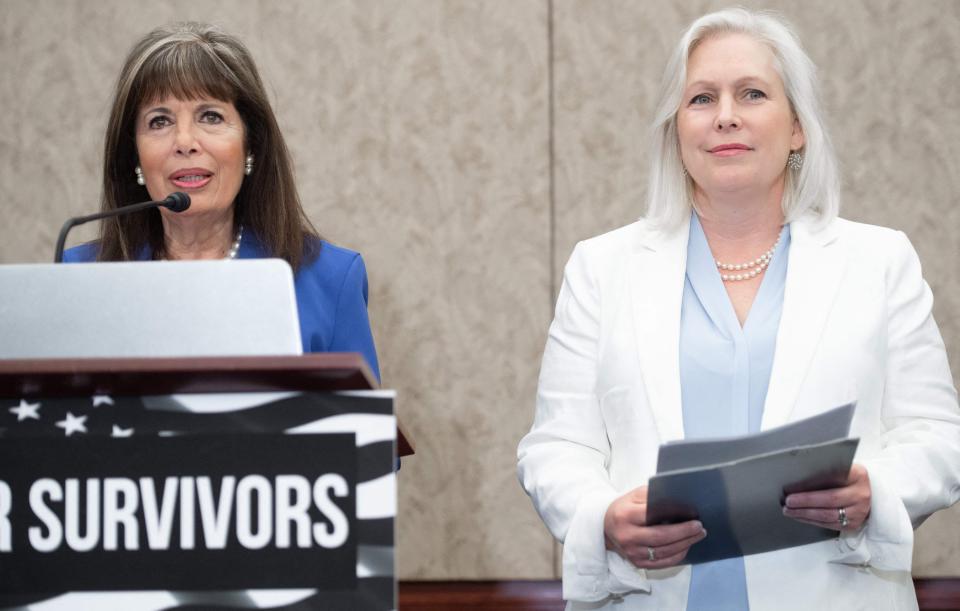We're closing in at last on fixing how military handles sexual assault: Gillibrand & Speier

When someone enlists in the military, they understand that serving their country means putting their life on the line. As one soldier once shared with us, she was prepared and trained to fight the enemy outside the wire but never thought the enemy would be a fellow soldier. Unfortunately, that’s all too often the case – as it was for Army Specialist Vanessa Guillen, who was sexually harassed by a supervisor before being brutally murdered by a fellow soldier on base at Fort Hood.
Currently, serious crimes like murder, kidnapping and sexual assault are processed by a military justice system that asks commanders, who are not trained lawyers, to decide whether complex cases go to trial, even when they know both the victim and the accused. That system is failing our service members.
It failed Specialist Guillen. It failed Air Force Airman First Class Natasha Aposhian, who was killed by another airman the day after she broke up with him. Just before she was murdered, she told her mother that she was afraid he was going to harm her. And it failed Army Private First Class Asia Graham, who was raped by another soldier in 2019. Her assailant went on to sexually and physically assault two other women before he faced any charges. Tragically, Pfc. Graham passed away before her rapist was convicted.
We have been fighting in the Senate and House for the better part of a decade to create a military justice system worthy of the sacrifice our service members make. But now we're finally on the brink of real change.
We've had enough studies and debate
The current military justice system has proven incapable of handling serious crimes or addressing the epidemic of sexual assault among the ranks. Last year, 20,500 service members were sexually assaulted, and only about a third of victims reported it. That’s likely because they know accountability is vanishingly rare. Of all sexual assaults against service members, only 1% conclude with a conviction at a military trial, known as a court-martial.
Opinions in your inbox: Get the best insights and analysis every morning
Since we started pressing for changes, we have heard increasingly unpersuasive arguments that we must first try a more modest reform, conduct another study or create another panel. Congress has now given the military more than $1 billion over a decade, enacted hundreds of legislative provisions, and chartered special panels, commissions and advisory committees to address the scourge of sexual assault in the military, and none of it has moved the needle.

Last week, our fight took a major step forward. Our bipartisan, commonsense bill to professionalize the military justice system, the Vanessa Guillen Military Justice Improvement and Increasing Prevention Act, was included in the Senate’s National Defense Authorization Act. Under our bill, commanders would continue to decide whether to prosecute misdemeanors and uniquely military crimes like desertion. But decisions about whether to prosecute serious crimes like sexual assault, aggravated assault and murder would be moved to independent, trained and professional military prosecutors.
Stop indulging the generals: Defend U.S. troops against sexual assault and harassment in the military – finally
This will give sexual assault survivors a system they can trust and provide real consequences for assailants. And it will give all of our service members confidence that if they are going to be charged with complex crimes that can result in serious sentences, the case will be handled by an experienced, unbiased military lawyer.
After years of obstruction, we are glad to see that the Secretary of Defense has agreed with the recommendations of the Independent Review Commission, which found removing sexual assault and domestic violence prosecutions from the chain of command and professionalizing military justice would benefit survivors without diminishing good order and discipline. We are also glad that President Joe Biden has endorsed this change. This is a historic sign of progress.
No separate system for sexual assault
However, we must go further. Survivors of sexual assault have asked us to take all non-military felonies out of the chain of command. They have told us time and time again that they do not want to be pushed into a separate judicial system that could be seen as stigmatizing to survivors of sexual assault.
Specialist Guillen’s case proves why dividing the system in two does not address the fundamental flaw in the military justice system. She was sexually harassed by one soldier and then murdered by another. Without the broader changes we seek, her murderer’s case would still be left in the hands of the same command that so deeply mishandled her case that her murderer was able to flee the base and end his own life. Her family will never have justice. We must work to ensure no other family faces the same fate.
Increasing urgency: Ending military sexual assault starts long before service members don uniform
The Vanessa Guillen Military Justice Improvement and Increasing Prevention Act would provide the consequences and impartiality that our service members need and deserve. It is supported by experts, by service members, and by a growing coalition of members of Congress from both parties – including 66 senators and more than 200 members of the House – who understand that it is past time for Congress to act and that, more importantly, it’s the right thing to do.
We must resist the urge to create a separate but unequal system of justice within the military and must guarantee a professional, unbiased system for all service members. That’s why it’s critical that our legislation was included in the Senate’s version of the NDAA. And that’s why it’s critical that it also be included in the House version, and signed into law.
Sen. Kirsten Gillibrand (@SenGillibrand) is a Democrat from New York and a member of the Senate Armed Services Committee. Rep. Jackie Speier (@RepSpeier) is a Democrat from California and chair of the House Armed Services subcommittee on military personnel.
You can read diverse opinions from our Board of Contributors and other writers on the Opinion front page, on Twitter @usatodayopinion and in our daily Opinion newsletter. To respond to a column, submit a comment to letters@usatoday.com.
This article originally appeared on USA TODAY: Serious crimes like sexual assault shouldn't be handled by commanders

 Yahoo Movies
Yahoo Movies 
